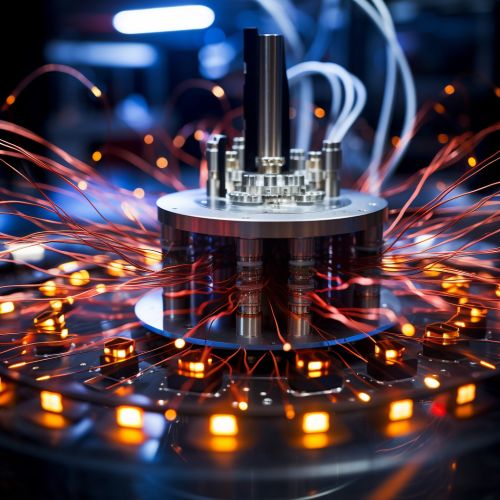Hybrid Quantum Systems
Introduction
Hybrid Quantum Systems (HQS) are a rapidly evolving field in quantum physics that combines different physical systems at the quantum level. These systems are designed to exploit the unique strengths of their constituent parts, enabling new ways to process and transmit quantum information. The study of HQS is a multidisciplinary field, involving elements of quantum mechanics, quantum optics, quantum information theory, and condensed matter physics.


Basics of Hybrid Quantum Systems
A Hybrid Quantum System is a composite system that combines two or more different quantum systems, each with its own distinct properties. The aim is to create a system that benefits from the strengths of its components while mitigating their weaknesses. This is achieved by coupling the components in such a way that they can exchange quantum information.
Components of Hybrid Quantum Systems
The components of a Hybrid Quantum System can be broadly classified into two categories: quantum processors and quantum memories. Quantum processors are systems that can perform quantum operations, while quantum memories are systems that can store quantum information.
Quantum Processors
Quantum processors are the 'workhorses' of Hybrid Quantum Systems. They are responsible for performing the quantum operations that are central to the functioning of the system. Examples of quantum processors include superconducting circuits, trapped ions, and quantum dots.
Quantum Memories
Quantum memories are systems that can store quantum information for extended periods. They are essential for tasks such as quantum communication and quantum computing, where information needs to be stored and retrieved at a later time. Examples of quantum memories include atomic ensembles, quantum repeaters, and quantum error correction systems.
Coupling in Hybrid Quantum Systems
Coupling is a fundamental concept in Hybrid Quantum Systems. It refers to the interaction between the components of the system, which allows them to exchange quantum information. There are several methods of coupling in Hybrid Quantum Systems, including electromagnetic coupling, optical coupling, and mechanical coupling.
Applications of Hybrid Quantum Systems
Hybrid Quantum Systems have a wide range of potential applications, from quantum computing and quantum communication to quantum sensing and quantum simulation.
Quantum Computing
In quantum computing, Hybrid Quantum Systems can be used to build more powerful and efficient quantum computers. By combining different quantum systems, it is possible to create a quantum computer that can perform a wider range of operations and store more quantum information than a single quantum system.
Quantum Communication
In quantum communication, Hybrid Quantum Systems can be used to transmit quantum information over long distances. This is achieved by using a quantum memory to store the information, and a quantum processor to perform the necessary operations for transmission.
Quantum Sensing
In quantum sensing, Hybrid Quantum Systems can be used to make highly sensitive measurements. By combining different quantum systems, it is possible to create a quantum sensor that can detect a wider range of signals and operate in a wider range of conditions than a single quantum system.
Quantum Simulation
In quantum simulation, Hybrid Quantum Systems can be used to simulate complex quantum systems. This can be useful for understanding the behavior of quantum systems that are difficult to study experimentally, such as high-temperature superconductors and quantum many-body systems.
Challenges and Future Directions
Despite the promising potential of Hybrid Quantum Systems, there are several challenges that need to be overcome. These include issues related to the coherence time of the quantum systems, the efficiency of the coupling, and the scalability of the systems. Future research in the field of Hybrid Quantum Systems will likely focus on addressing these challenges and exploring new ways to combine quantum systems.
